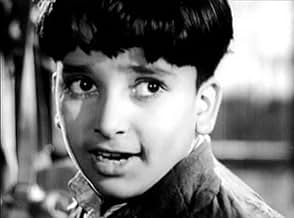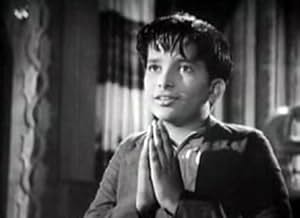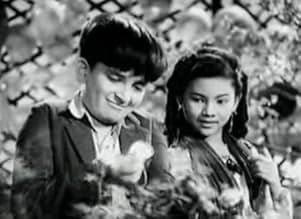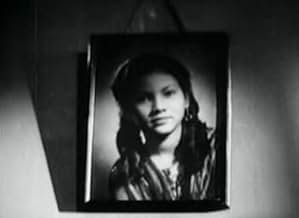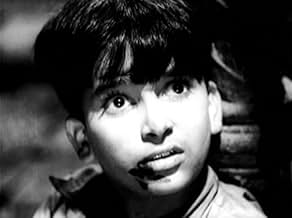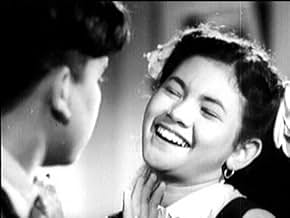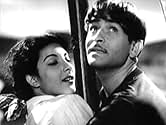AVALIAÇÃO DA IMDb
7,8/10
4,8 mil
SUA AVALIAÇÃO
Adicionar um enredo no seu idiomaA poor young man named Raj joins a criminal gang to feed his mother. But when he falls in love with Rita, he decides to reform himself for her.A poor young man named Raj joins a criminal gang to feed his mother. But when he falls in love with Rita, he decides to reform himself for her.A poor young man named Raj joins a criminal gang to feed his mother. But when he falls in love with Rita, he decides to reform himself for her.
- Prêmios
- 1 indicação no total
Prithviraj Kapoor
- Justice Raghunath
- (as Prithviraj)
Shashi Kapoor
- Young Raj
- (as Shashiraj)
Brij Mohan Vyas
- Dubey (Rita's Father)
- (as B.M. Vyas)
Leela Mishra
- Mr. Raghunath's Sister-In-Law
- (as Leela Misra)
Avaliações em destaque
This movie is itself a legend. In 1988 TRT (Turkish national television) was to show that film. As I was a little child I could not now about the movies but that day my mother, grandmother, my uncles wife all got together and prepared delicious foods, and watched that movie on TV. Perhabs on that day all women in Turkiye were watching that film.
Mavi Boncuk, a delicious movie has reference to this film. On that movie Munir Ozkul says: - Aaah Awaara (at the time he looks to Awaara's poster) I've grown my children by selling it's tickets, played for 6 months on those days.
It is a fact that Awaara was a great success, on those days a film was playing for only a week but Awaara was in vision for 6 great months. I only remembered a scene from the film I watched when I was 6 years old, this is the scene that Raju stole a watch. Then 3 years ago I bought this film and watched with friends, my friends were very impressed with the movie, and we watched again and again.
Awaara is a milestone for Turkish cinema, it is filmed again by great Turkish actor Sadri Alisik in 1966. Arabesk is stated to enter Turkiye with Awaara. Adalet Cimcoz and Ferdi Tayfur spoke Nargis and Raj Kapoor in Awaara's Turkish dubbing version and film is great with that excellent dubbing.
Films song is also sung in Turkish lyrics by Sadri Alisik and song was also a hit.
Mavi Boncuk, a delicious movie has reference to this film. On that movie Munir Ozkul says: - Aaah Awaara (at the time he looks to Awaara's poster) I've grown my children by selling it's tickets, played for 6 months on those days.
It is a fact that Awaara was a great success, on those days a film was playing for only a week but Awaara was in vision for 6 great months. I only remembered a scene from the film I watched when I was 6 years old, this is the scene that Raju stole a watch. Then 3 years ago I bought this film and watched with friends, my friends were very impressed with the movie, and we watched again and again.
Awaara is a milestone for Turkish cinema, it is filmed again by great Turkish actor Sadri Alisik in 1966. Arabesk is stated to enter Turkiye with Awaara. Adalet Cimcoz and Ferdi Tayfur spoke Nargis and Raj Kapoor in Awaara's Turkish dubbing version and film is great with that excellent dubbing.
Films song is also sung in Turkish lyrics by Sadri Alisik and song was also a hit.
in the East of Europe, under the Comunist regime, the Indian films have had a special status. as alternative to the Soviet movies and propaganda shows. but, in same measure, for the social message. clear . for romanticism and music and charm of actors and dramatic situations. but Awaara was more than a successful Indian film. it was, and remains, an epic. because it gives the right perspective about ordinary, every day situations. because it reminds the joy of life and the deep pain.because it is , like the childhood fairy tales, story of courage and self determination and love difficulties , sacrifice and happiness. because it is nice and bitter and translation in image of known situations. and, sure, for Raj Kapoor. in the East , the Indian film was an open window. Awaara was, for years, one of the most convincing examples.
I have always like watching movies. However, as time went by, I have only known of Hollywood, European, Japanese, and Filipino cinema.
When I learned that Awara is one of Time Magazine's Top 100, I got a copy. The movie called my attention because I haven't seen a Bollywood movie.
I watched Awara, and I was entertained. All the genre you can think of, you'll find it there. Name it: melodrama, action, comedy, romance, music, fantasy. Raj Kapoor craftily weaved them in the almost three hour-long classic.
Behind the melodrama is the social commentary. The conflict between a person versus the orthodox beliefs of the milieu is a recurring theme each of us face in everyday life. Pressures to adhere to the norm led the main character to his plight. Children growing up in squalid areas is an important issue tackled.
The musical sequences showed the movie's multi-faceted nature. It showed references to Chaplin, Rodgers/Hammerstein, and the like. Particularly amazing is the dream sequence in an east meets west setting. Elements of Hindu-Buddhist mythology are mingled with those of ancient Greco-Roman.
The eclectic experience solidified my belief that Bollywood is indeed a pillar of world cinema. I look forward to watching more.
When I learned that Awara is one of Time Magazine's Top 100, I got a copy. The movie called my attention because I haven't seen a Bollywood movie.
I watched Awara, and I was entertained. All the genre you can think of, you'll find it there. Name it: melodrama, action, comedy, romance, music, fantasy. Raj Kapoor craftily weaved them in the almost three hour-long classic.
Behind the melodrama is the social commentary. The conflict between a person versus the orthodox beliefs of the milieu is a recurring theme each of us face in everyday life. Pressures to adhere to the norm led the main character to his plight. Children growing up in squalid areas is an important issue tackled.
The musical sequences showed the movie's multi-faceted nature. It showed references to Chaplin, Rodgers/Hammerstein, and the like. Particularly amazing is the dream sequence in an east meets west setting. Elements of Hindu-Buddhist mythology are mingled with those of ancient Greco-Roman.
The eclectic experience solidified my belief that Bollywood is indeed a pillar of world cinema. I look forward to watching more.
This is a classic Bollywood movie and seminal Raj Kapoor - Nargis vehicle, forcing home to the audience all manner of stereotypes, prejudices and assumptions before systematically dismantling them all with a sledgehammer. It was another of RK's successful and respectful attempts at mass entertainment mixed with mass education, generations later it's all so obvious that unfortunately we can lose sight of how much good it did at the time and just how well-intentioned it was.
I was watching the colourful Suraj a while ago and was reminded of old black and white Awara which I hadn't seen in decades – it's another take on once a bandit's son always a bandit's son; or, Blood vs Destiny. Delinquent wastrel and felon Raj is the kicked about son of a strict old-fashioned judge (played by Prithviraj) which neither of them realise, he and childhood friend Nargis who is now the judge's ward fall in love and, well, it spirals out of control for everyone. Is it Nature or is it Nurture that has made him a proud tramp? Some lovely noirish photography and atmospheric flashback scenes complement a melodramatic storyline, and there's even time for an admirable dream/nightmare sequence. It's a marvellous, if very contrived film with plenty of ideas, some tremendous images and great music by Shankar - Jaikishan as it is but as usual for me whenever the incomparable Lata sings it's turned into something even more special. Favourite bits: Nargis never looked lovelier or more iconic throughout but Aa Jao Tadapte Hain Arman with RK stroking her hair takes top prize; the literally dreamy and fascinating Tere Bina Aag Yeh Chandni; and RK does his anthem Awara Hoon too. According to Lata it took a whole night to record the music for the dream sequence.
So many sincere films made over the last 50 years have no morality, at the most charitable most don't even know the meaning of the word; so what's so bad about a film having too much? Nothing wrong at all with Good beating Evil! Imho, even though poverty still breeds crime while Our Betters still deny it, Raj Kapoor's finest film.
I was watching the colourful Suraj a while ago and was reminded of old black and white Awara which I hadn't seen in decades – it's another take on once a bandit's son always a bandit's son; or, Blood vs Destiny. Delinquent wastrel and felon Raj is the kicked about son of a strict old-fashioned judge (played by Prithviraj) which neither of them realise, he and childhood friend Nargis who is now the judge's ward fall in love and, well, it spirals out of control for everyone. Is it Nature or is it Nurture that has made him a proud tramp? Some lovely noirish photography and atmospheric flashback scenes complement a melodramatic storyline, and there's even time for an admirable dream/nightmare sequence. It's a marvellous, if very contrived film with plenty of ideas, some tremendous images and great music by Shankar - Jaikishan as it is but as usual for me whenever the incomparable Lata sings it's turned into something even more special. Favourite bits: Nargis never looked lovelier or more iconic throughout but Aa Jao Tadapte Hain Arman with RK stroking her hair takes top prize; the literally dreamy and fascinating Tere Bina Aag Yeh Chandni; and RK does his anthem Awara Hoon too. According to Lata it took a whole night to record the music for the dream sequence.
So many sincere films made over the last 50 years have no morality, at the most charitable most don't even know the meaning of the word; so what's so bad about a film having too much? Nothing wrong at all with Good beating Evil! Imho, even though poverty still breeds crime while Our Betters still deny it, Raj Kapoor's finest film.
Awaara is a stunning example of full tilt filmmaking. Featuring superb (and appropriate) musical interludes by the Shankar-Jaikashan team, this film effortlessly blends a wide range of influences: noir, gothic horror, neo-realism, and the surrealism of Jean Cocteau all come into play. Raj Kapoor and Nargis are one of the finest screen couples of all time, equaling if not topping Jean-Louis Barrault and Arletty in Children of Paradise, another possible cinematic influence on Kapoor, who also directed. This is an exciting, moving, and unforgettable film.
Você sabia?
- CuriosidadesIn Awaara, there are three genaration of the Kapoor family in the film. There is Deewan Kapoor in the film, who was the grandfather of Raj Kapoor (father of pritviraj ) who plays the role of judge, who comes in the beggining of the film and in the end, then Raj Kapoor's father, Pritviraaj and also his young brother, Shashi Kapoor (junior raj kapoor ) were also in this film. As a filmaker this was Raj Kapoor, his third film. This film got very famous in Russia. In a outdoor scene of Raj with Nargis, in the background, the music of the song ' na mangu sona chandi' could be heard there, 20 years later this tune was used in a song of. Bobby.
- ConexõesFeatured in Century of Cinema: And the Show Goes On: Indian Chapter (1996)
- Trilhas sonorasAwara Hoon
Sung by Mukesh
Music composed by Shankarsingh Raghuwanshi and Jaikishan Dayabhai Panchal (as Shankar-Jaikishan)
Lyrics by Shailendra
Principais escolhas
Faça login para avaliar e ver a lista de recomendações personalizadas
- How long is Awaara?Fornecido pela Alexa
Detalhes
- Tempo de duração
- 3 h 13 min(193 min)
- Cor
- Proporção
- 1.37 : 1
Contribua para esta página
Sugerir uma alteração ou adicionar conteúdo ausente


